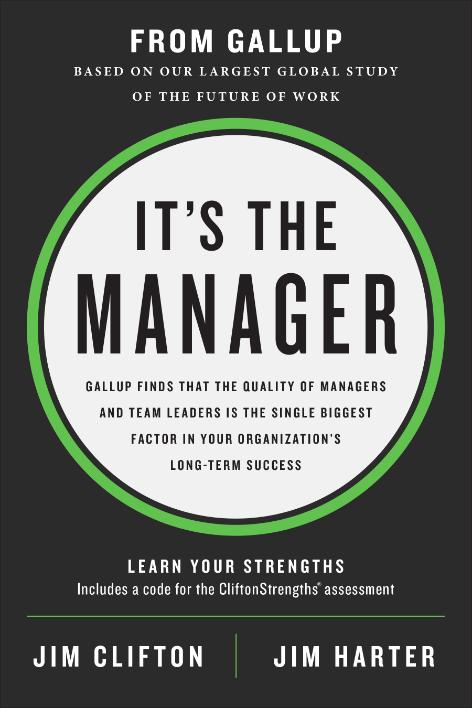Story Highlights
- Great teamwork springs from great communication
- It's up to managers to improve communication and foster teamwork
- Learn how to promote teamwork with five conversations
This article contains original content but includes updated links to our latest research.
Performance blossoms when employees have the sense of connection and belonging that a great team provides. Employees need to know who they can depend on and how their work fits into the big picture -- what it's all for. They also need to know how they can support others at work.
One of the most important prerequisites for effective teamwork is ongoing conversations between managers, employees and teammates.
When healthy communication is part of "how we do things," employees are more likely to have clear expectations that align with leaders' overarching objectives. They're also better able to understand one another and collaborate to overcome hurdles, accomplish team goals and navigate change in the workplace.
Ultimately, excellent teamwork supports engagement, revenue, retention and streamlined customer experiences with "handoffs" between employees that feel effortless.
Great Managers: The Gateway to Strong Team Communication
The single most important factor for strengthening team communication is the manager. Great managers consistently check in with employees and help them build social connections in the organization. They also facilitate genuine bonds and productive, performance-driving conversations.
It's not enough to simply talk more. Discussions should have substance and purpose -- without leaving employees feeling micromanaged. And communication should be a two-way street.
Managers need to communicate updates and ask questions. But perhaps even more importantly, employees need to feel like their opinions count and they can freely discuss roadblocks, ideas and other workplace concerns (with their manager and teammates).
The single most important factor for strengthening team communication is the manager.
Gallup has discovered a practical framework for how and when managers should have conversations with employees. Our research reveals five coaching conversations that enable managers to establish expectations, continually coach and create accountability.
When managers have these conversations regularly, employees are more energized, engaged and equipped -- which makes them better teammates.
And when managers bring their team together for these conversations, they strengthen bonds and create meaningful team experiences that inspire, motivate and engage employees. Consistent communication is essential for collaboration and performance.
Make the five conversations part of your work culture, and better teamwork will follow.
The Five Conversations That Drive Great Teamwork
Role and Relationship Conversation: The Foundation for Performance and Development
Role and Relationship conversations allow managers to define what success looks like in the individual's role and set goals that stretch employees to achieve their best performance.
These conversations also help employees see how their work relates to overall company objectives and their teammates' goals and strengths. And they help employees understand how to aim their strengths to further shared objectives -- which ultimately contributes to improved team performance.
Quick Connect: Engaging Conversation
Quick Connect conversations are short, informal interactions (think coffee chats or five-minute video calls) that help employees stay connected and build relationships. Quick Connects are not working meetings -- they're opportunities to touch base about how employees are doing and what they're excited about. For managers, the purpose of Quick Connect conversations is to show that you care, you're interested in employees as people and you're available.
During a Quick Connect, managers can give an employee timely recognition for a recent success, listen to the employee's ideas or simply ask what's on the employee's mind.
These brief conversations should occur among teammates, too. When teammates connect informally, they build connections that translate to heightened collaboration and team performance.
Check-In: Discuss Priorities and Progress
More planned than Quick Connects, Check-In conversations happen less frequently (at least once per month) and are working meetings about progress and priorities. These 30- to 60-minute conversations are an opportunity to review expectations, address obstacles and identify where employees need support.
Managers should facilitate team Check-Ins to keep team members on the same page about progress and priorities. Planned, consistent team communication creates stability, clarifies expectations and builds alignment -- helping team members feel supported and perform at their best.
Developmental Coaching: In-the-Moment Feedback
Developmental Coaching conversations focus on immediate feedback, relevant advice and proactive coaching -- in the moment. These employee-focused conversations allow managers to provide individualized coaching when it matters most and offer tailored direction, support and advice to improve real-time performance.
Developmental Coaching conversations should be future-focused and centered on improvement (not judging or criticizing). This gives each individual a vision for success and a plan for getting there. And because people learn best when they harvest lessons in the moment, Developmental Coaching supports individual and team performance.
When managers use Developmental Coaching conversations to help teammates develop together, they open a dialogue about learning from shared experiences. For instance, a quick huddle after a safety incident or near miss can help teams improve and learn together. Or following a successful presentation, teams can discuss what went well and how to replicate that success in the future.
Progress on Goals: Achievements and Future Growth
These formal progress conversations occur every six months and should cover the team's performance and development goals. Like traditional performance reviews, team Progress on Goals conversations should include metrics and documentation of achievements and areas for improvement. These conversations are a coaching tool for reflection and growth -- an opportunity to celebrate successes and align on future growth targets.
Team collaboration should be a key pillar of these reviews -- managers can clarify how the individual's contributions matter to the team and how the team's collective efforts come together. Ask employees to identify their best partners and discuss any barriers to effective collaboration. How can employees use their strengths to become better partners themselves?
What to Do Next
For managers:
- Over the next few months, schedule time to check in with your team on a regular basis.
- Begin helping team members understand one another's strengths -- and help them practice using that knowledge about each other to better plan, strategize, analyze and direct their actions.
- Encourage teammates to schedule regular Quick Connect conversations with key internal partners.
For leaders: Make your managers' jobs easier by providing them with the resources and training they need to excel at facilitating coaching conversations.
For employees:
- Remember: Social connections are an important part of your wellbeing -- and team bonding can occur in a virtual setting.
- Ask your manager about making team Check-Ins a regular occurrence -- including developmental conversations about how the team can achieve performance and development goals.
- Start using these five conversations as a tool for team collaboration and to form meaningful relationships at work.
Build a workplace where teamwork makes the dream work:
- Learn best practices for implementing manager development programs to help employees grow, thrive and win.
- Learn more about the Gallup Manager Program, our flagship manager training course for creating highly engaged teams.
Gallup®, CliftonStrengths® and each of the 34 CliftonStrengths theme names are trademarks of Gallup. Copyright © 2000 Gallup, Inc. All rights reserved.





